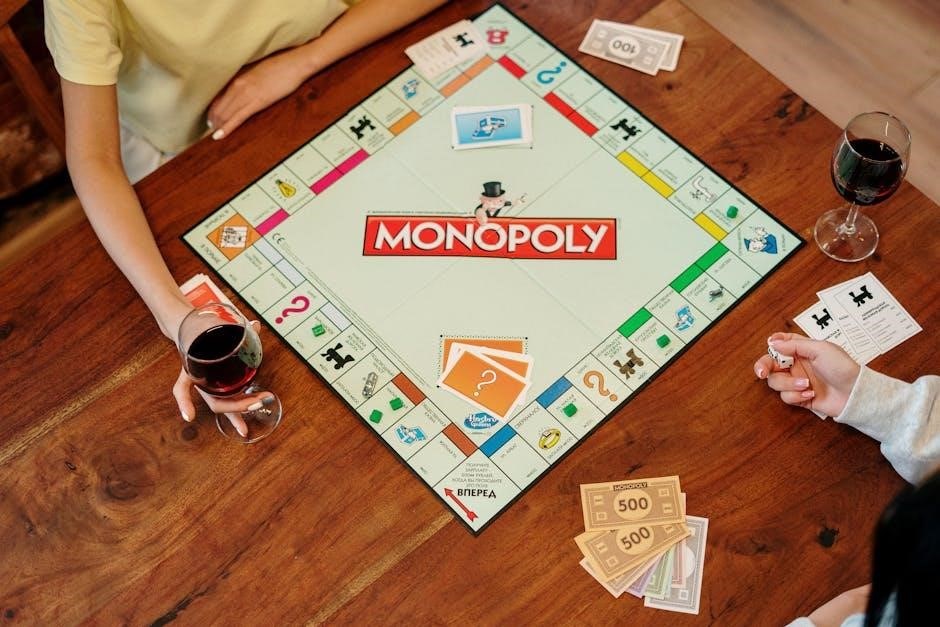monopoly deal rules pdf

Discover the official Monopoly Deal rules PDF for a comprehensive guide to setup‚ gameplay‚ and winning strategies. Master property collection‚ action cards‚ and money management to dominate the game!
Overview of Monopoly Deal Card Game
Monopoly Deal is a fast-paced card game where players collect properties‚ use action cards‚ and manage money to outsmart opponents. The goal is to be the first to gather three full property sets of different colors. Action cards like Deal Breaker and Sly Deal add strategic depth‚ allowing players to disrupt others or negotiate deals. With its quick gameplay and family-friendly design‚ Monopoly Deal is ideal for 2-5 players aged 8+‚ offering a fun twist on the classic Monopoly experience.
Importance of Understanding the Rules
Understanding the official Monopoly Deal rules is crucial for smooth and fair gameplay. Knowing how to use action cards like Debt Collector or Deal Breaker can shift the game’s outcome. Familiarity with property collection‚ rent payment‚ and winning conditions ensures players avoid confusion and disputes. Misinterpreting rules can lead to unfair advantages or prolonged games. By mastering the rules‚ players can strategize effectively‚ enjoy competitive gameplay‚ and maximize their chances of winning. Referencing the official Monopoly Deal rules PDF guarantees a consistent and enjoyable experience for all participants.
How to Download the Official Rules PDF
To access the official Monopoly Deal rules PDF‚ visit the official Hasbro website or trusted sources like Scribd or PDFDrive. Search for “Monopoly Deal rules PDF” and select the latest version. Download the file to learn detailed gameplay mechanics‚ including property collection‚ action card usage‚ and winning strategies. The PDF provides clear instructions on setup‚ turn structure‚ and victory conditions‚ ensuring players understand the game fully. Referencing the official guide guarantees a consistent and enjoyable experience for all players.

Setting Up the Game
Start by removing the Quick Start rules and shuffling the deck. Deal 5 cards to each player‚ ensuring everyone begins with a balanced hand. The remaining cards form the draw pile.
Number of Players and Age Requirements
Monopoly Deal is designed for 2 to 5 players‚ making it a versatile option for small or larger groups. The recommended age range is 8 years and above‚ ensuring younger players can grasp the strategic elements. This accessibility makes it a great family game while still offering depth for competitive play. The rules remain consistent regardless of the number of players‚ maintaining balance and fairness across different group sizes.
Deck Composition: Property Cards‚ Action Cards‚ and Money Cards
The Monopoly Deal deck consists of three main card types: Property‚ Action‚ and Money. Property cards are divided into color-coded sets‚ which players aim to collect to win. Action cards‚ totaling 34‚ include types like Deal Breaker‚ Sly Deal‚ and Debt Collector‚ each offering unique strategic advantages. Money cards are used for transactions‚ with values ranging from $1 to $10‚000. Together‚ these cards create a dynamic and fast-paced gameplay experience‚ blending strategy and luck in a compact format.
Initial Setup and Distribution of Cards
Begin by removing the 4 Quick Start Rules cards from the deck. Shuffle the remaining cards and deal 5 cards to each player. Place the remaining deck face down in the center of the table. The top card of the deck is turned over and placed beside the draw pile to start the discard pile. Players should keep their cards secret and organize them strategically. The game is ready to begin‚ with the first player determined by a random draw or mutual agreement among players.

Objective of the Game
The goal is to be the first player to collect three full property sets of different colors. Use action cards strategically to outsmart opponents and achieve victory.
Goal: Collecting Three Full Property Sets
The primary objective is to collect three full property sets of different colors. Each set consists of all properties in a specific color group‚ as outlined in the rules. Action cards like Deal Breaker and Sly Deal can disrupt opponents or steal their properties. Players must strategically acquire and organize properties‚ using money cards to pay debts or charges. Placing completed sets on the table showcases progress‚ and the first player to achieve three distinct sets wins the game. Mastery of property collection and action card usage is key to success.
Understanding Property Sets and Colors
In Monopoly Deal‚ properties are grouped into sets by color‚ with each set containing specific properties. For example‚ the orange group includes St. Charles Place‚ States Avenue‚ and Virginia Avenue. The light blue group features Park Place and Boardwalk. Completing a set allows you to charge rent‚ increasing its value with houses and hotels. Action cards like Debt Collector can disrupt opponents’ collections. Understanding these groupings and their values is crucial for strategic play‚ as outlined in the official Monopoly Deal rules PDF.
Winning Conditions and Victory Criteria
The game concludes when a player successfully assembles three complete property sets of different colors. Each set must consist of all properties within a specific color group‚ as outlined in the Monopoly Deal rules PDF. The first player to achieve this wins immediately. Strategic use of action cards can disrupt opponents‚ while efficient property collection and rent management are key to securing victory. The goal is to outmaneuver others by completing sets before they do‚ ensuring you emerge as the ultimate Monopoly Deal champion.

Gameplay Overview
Players draw‚ play‚ and discard cards‚ using action cards strategically to disrupt opponents. The game ends when one player collects three property sets‚ securing victory.
Starting the Game and First Player Selection
To begin‚ remove the 4 Quick Start Rules cards from the deck and shuffle the remaining cards. Each player is dealt 5 cards. The youngest player goes first‚ or players can draw cards to determine who starts. The highest card drawn decides the first player‚ with action cards counting as zero. The first player draws two cards at the start of their turn‚ setting the game in motion. Play proceeds clockwise‚ with each player drawing‚ playing‚ and discarding cards to build their property empire.
Turn Structure: Drawing‚ Playing‚ and Discarding Cards
Each turn begins with drawing two cards from the deck. Players can then play up to three cards‚ including property cards‚ action cards‚ or money cards. Action cards can be used strategically to charge rent‚ steal properties‚ or disrupt opponents. Property cards are organized into sets‚ while money cards are added to the player’s bank. At the end of the turn‚ one card is discarded‚ and play passes to the next player. The turn structure ensures dynamic and fast-paced gameplay‚ keeping all players engaged and strategizing throughout.
End of Turn Procedures and Card Limits
At the end of each turn‚ players must discard one card from their hand. The total number of cards a player can hold is limited to seven. If a player exceeds this limit‚ they must discard excess cards. Property sets placed on the table remain visible‚ contributing to the player’s progress toward victory. Properly managing cards and adhering to limits ensures smooth gameplay and fairness for all participants. These procedures maintain the game’s balance and pace‚ keeping everyone focused on strategic moves and property collection.

Action Cards in Monopoly Deal
Action cards are crucial for strategic gameplay‚ enabling players to disrupt opponents‚ charge rent‚ or steal properties‚ enhancing their chances of winning effectively.
Types of Action Cards: Deal Breaker‚ Just Say No‚ Sly Deal‚ Force Deal‚ Debt Collector‚ and It’s My Birthday
- Deal Breaker: Steal a completed property set from another player.
- Just Say No: Cancel another player’s action card or rent demand.
- Sly Deal: Take a property card from another player’s collection.
- Force Deal: Trade one of your cards with a card from another player’s hand.
- Debt Collector: Charge another player $5 and take their money.
- It’s My Birthday: Collect $2 from every other player in the game.
Using Action Cards for Strategic Advantage
Action cards can drastically alter the game’s dynamics when used wisely. Timing is key—use Debt Collector when opponents have money‚ or Deal Breaker to steal a completed set. Force Deal allows you to trade strategically‚ while Sly Deal lets you snatch a property discreetly. Just Say No can block rent demands or other actions‚ protecting your assets. Play multiple action cards in one turn for maximum impact. Use these cards to disrupt opponents‚ gain advantages‚ and accelerate your path to victory while managing your resources effectively.
Limitations and Restrictions on Action Cards
Action cards have specific rules governing their use. Players can only use one action card per turn unless the card explicitly allows otherwise. Certain cards‚ like Debt Collector‚ can only be played if another player has enough money to pay. Deal Breaker can only be used on completed property sets. Action cards cannot be used as money unless specified. Timing is critical‚ as some cards‚ like Just Say No‚ can only be played in response to another action. Understanding these restrictions is essential for strategic play and avoiding invalid moves.

Property Cards and Collection
Property cards are central to Monopoly Deal‚ with each card representing a specific value. Players aim to collect complete sets of different colors to secure victory.
Acquiring and Organizing Property Cards
Players acquire property cards through drawing or using action cards like Deduct Collector. Organize them by color to form complete sets‚ which are essential for winning. Each property card specifies its value and color group. Strategically collect and arrange them to complete sets quickly. Proper organization helps track progress and plan moves effectively. Use action cards wisely to disrupt opponents or accelerate your collection. Focus on gathering three full sets of different colors to achieve victory.
Completing Sets and Placing Them on the Table
Once a player collects all properties in a color group‚ they can place the completed set on the table. This action is crucial as it brings the player closer to winning. When placing a set‚ the player announces the completion and arranges the cards face up. Completed sets cannot be stolen or disrupted by action cards. Players can collect money from the bank for placing sets‚ and others must pay rent when landing on these properties. Strategically timing the placement of sets can maximize their strategic advantage and disrupt opponents’ plans effectively.
Strategies for Property Collection and Management
Focus on collecting complete property sets by prioritizing high-value colors. Use action cards like Sly Deal or Force Deal to acquire missing properties from opponents. Organize your properties strategically‚ placing completed sets on the table to earn rent. Avoid holding too many incomplete sets‚ as they can burden your hand. Trade wisely and negotiate with others to fill gaps in your collection. Managing your properties effectively and timing their placement can significantly enhance your chances of winning the game. Always keep track of opponents’ progress to stay ahead.

Money Management in Monopoly Deal
Effectively manage your money cards to handle transactions‚ pay rent‚ and avoid debt. Use Debt Collector cards to recover funds and maintain financial stability throughout the game.
Handling Money Cards and Bank Transactions
Money cards are essential for transactions in Monopoly Deal. Players can use them to pay rent‚ settle debts‚ or fund actions. Each money card has a specific value‚ and transactions must be exact. When paying rent‚ ensure you have sufficient funds to avoid penalties. Debt Collector cards can be used to reclaim money from other players‚ aiding in financial recovery. Proper management of your bank ensures liquidity for strategic moves‚ keeping you competitive throughout the game. Always maintain enough cash to cover unexpected expenses or actions initiated by others.
Paying Rent and Charging Other Players
Rent is charged when a player places a completed property set on the table. The amount is determined by the property card’s value and any houses or hotels present. Players can pay using money cards or action cards with monetary values. Exact change is required. If a player cannot pay‚ they may negotiate with the charging player or risk bankruptcy. Charging rent strategically disrupts opponents’ cash flow‚ creating opportunities to gain an advantage. Proper rent management is key to maintaining financial stability and outmaneuvering competitors in the game.
Debt Collection and Bankruptcy Rules
Bankruptcy occurs when a player cannot pay rent or debts‚ forcing them to return all properties and discard remaining cards. Players declare bankruptcy by announcing it and removing themselves from the game. Debt Collector cards allow players to demand money from opponents‚ who must pay using available funds. If unable to pay‚ the player goes bankrupt. Proper debt management and strategic use of Debt Collector cards can protect players from bankruptcy while forcing opponents out of the game‚ ensuring a stronger position to win.

Rent and Debt Collection
Rent is charged when players land on properties‚ with amounts increasing if Houses or Hotels are present. Debt Collector cards enforce immediate payments‚ aiding recovery of owed money.
When and How Rent is Charged
Rent is charged when a player lands on a property owned by another player. The amount is determined by the property’s value‚ which increases if Houses or Hotels are present. To charge rent‚ the property must be part of a complete set. Action cards like Debt Collector can force immediate payments. Players must pay the specified rent or risk penalties‚ ensuring timely payments are crucial for maintaining financial stability in the game.
Using Debt Collector Cards to Recover Money
A Debt Collector card allows you to recover money from another player. When played‚ the targeted player must pay you either $5 million or half of their cash‚ whichever is less. This card is strategic for gaining financial advantage or forcing opponents into debt. Use it wisely to disrupt rivals or replenish your funds. Timing is key‚ as it can significantly impact the game’s momentum and your opponents’ financial stability. Proper use of Debt Collector cards can turn the tide in your favor.
Houses and Hotels: Their Role in Rent Payment
In Monopoly Deal‚ Houses and Hotels are not physical pieces but are represented as cards. They serve to increase the rent that players must pay when landing on your properties. To build Houses or Hotels‚ you typically need to own all properties in a specific color group‚ similar to the classic board game. Each House card increases the rent by a fixed amount‚ while a Hotel card significantly boosts it. The number of Houses or Hotels per property may be limited‚ and you can strategically use them to maximize rent collection. If a player cannot pay the rent‚ they might need to discard cards or use money cards to avoid bankruptcy. Managing Houses and Hotels effectively can provide a strategic advantage‚ enhancing your rental income and pressuring opponents financially.

Strategy and Tips for Winning
Mastering Action Cards‚ efficient money management‚ and strategic property collection are key to winning. Use these tactics to outsmart opponents and secure victory.
Effective Use of Action Cards
Action Cards like Deal Breaker and Sly Deal can disrupt opponents or gain advantages. Use them strategically to break deals or steal properties. Timing is crucial—save them for key moments to maximize impact. Understand each card’s unique ability and play them wisely to avoid wasting opportunities. Balance using them with holding them for future turns to maintain flexibility. Be mindful of other players’ reactions and plan counters‚ such as using Just Say No to block their actions. Mastering Action Cards enhances your strategy and boosts your chances of winning.
Smart Property Management and Trading
Organize your properties by color to track progress toward full sets. Trade strategically to complete sets quickly while disrupting opponents. Focus on high-rent properties and prioritize completing them first. Be cautious with trades—never give away valuable cards without gaining an advantage. Keep a balanced collection and avoid overextending your resources. Smart trading and management are key to building a strong foundation and securing victory. Always aim to improve your position while limiting opponents’ opportunities to succeed.
Monetary Strategy and Debt Avoidance
Maintain a strong cash reserve to avoid bankruptcy and ensure flexibility. Use Debt Collector cards strategically to recover funds from opponents. Minimize debt by managing rent payments and avoiding unnecessary expenses. Prioritize earning and saving money to stay financially stable. Use money cards wisely to balance transactions and maintain liquidity. Avoid over-relying on action cards for financial gain. Focus on sustainable monetary strategies to outlast opponents and secure victory. Smart money management enhances your ability to collect rent and complete property sets effectively.

Common Mistakes to Avoid
Overlooking official rules can lead to incorrect gameplay. Misusing action cards or mishandling properties and money often results in poor strategic decisions and lost opportunities to win.
Overlooking Official Rules
Many players make up or ignore official rules‚ leading to confusion and prolonged games. According to Hasbro‚ nearly half of players invent rules‚ while 68% admit to not reading the official guidelines. This oversight often results in incorrect gameplay‚ such as improper use of action cards or misunderstanding property collection rules. To ensure a smooth and enjoyable experience‚ it’s essential to familiarize yourself with the official Monopoly Deal rules PDF. Neglecting these guidelines can lead to disputes and prevent players from fully mastering the game’s strategic depth.
Improper Use of Action Cards
Misusing action cards can disrupt gameplay and lead to unfair advantages. For example‚ playing a Deal Breaker or Force Deal without following the rules can cause confusion. Action cards like Debt Collector or It’s My Birthday must be used correctly to avoid slowing the game. Misunderstanding their roles‚ such as using them as money when they shouldn’t be‚ can lead to disputes. Always refer to the official Monopoly Deal rules PDF to ensure proper usage and maintain a smooth‚ enjoyable experience for all players.
mismanagement of Properties and Money
Mismanagement of Properties and Money
Poorly managing properties and money can quickly lead to losing the game. Failing to organize properties by color or neglecting to complete sets can hinder progress. Overspending or not collecting rent when possible reduces financial flexibility. Misusing Houses and Hotels‚ such as not placing them on completed sets‚ wastes opportunities to increase rent. Ignoring debt collection or improper use of money cards can lead to bankruptcy. Refer to the Monopoly Deal rules PDF to avoid these common pitfalls and maintain a competitive edge throughout the game.
Mastering Monopoly Deal requires understanding its rules and strategies. Download the official Monopoly Deal rules PDF to ensure you play correctly and maximize your chances of winning.
Final Thoughts on Mastering Monopoly Deal
Mastering Monopoly Deal involves a blend of strategy and luck. Focus on collecting full property sets‚ using action cards wisely‚ and managing your money effectively. Practice regularly to refine your skills and adapt to different playing styles. Downloading the official Monopoly Deal rules PDF ensures clarity on gameplay mechanics‚ helping you avoid common mistakes. By understanding the rules deeply and applying strategic thinking‚ you can outsmart opponents and emerge victorious. Keep experimenting with different tactics to enhance your gameplay experience!
Encouragement to Practice and Play
Regularly practicing Monopoly Deal sharpens your strategic thinking and familiarity with the rules. Start by reviewing the official Monopoly Deal rules PDF to grasp gameplay nuances. Experiment with different strategies‚ such as prioritizing property collection or aggressively using action cards. Playing frequently allows you to adapt to various opponent styles and refine your tactics. Encourage friends and family to join for fun‚ competitive sessions. Remember‚ the more you play‚ the better you’ll become at outsmarting others and securing victories. Embrace the game’s excitement and make it a enjoyable pastime!
Downloading the Official Monopoly Deal Rules PDF
Accessing the official Monopoly Deal rules PDF is essential for understanding gameplay‚ strategies‚ and official regulations. Visit the Hasbro website or trusted sources like Scribd to download the PDF for free. This guide provides detailed instructions on setup‚ card types‚ and winning conditions. Ensure you verify the source for authenticity to avoid misinformation. Having the official rules handy allows players to resolve disputes and master the game effectively. Download the PDF today and enhance your gameplay experience!
Additional Resources
Find the official Monopoly Deal rules PDF on Hasbro’s website or trusted platforms like Scribd. Explore community forums‚ strategy guides‚ and video tutorials for enhanced gameplay and tips.
Official Hasbro Monopoly Deal Website
The official Hasbro Monopoly Deal website is your primary source for authentic game rules‚ downloads‚ and resources. It offers the official Monopoly Deal rules PDF‚ ensuring accurate gameplay. Explore detailed guides‚ FAQs‚ and visual aids like images of the rulebook’s front and back. Discover how to win‚ game objectives‚ and action card strategies. The site also lists all 34 action cards‚ including Deal Breaker‚ Debt Collector‚ and more. Visit for the most reliable and up-to-date information to enhance your gaming experience.
Community Forums and Strategy Guides
Engage with community forums and strategy guides to enhance your Monopoly Deal experience. Players share tips‚ optimal strategies‚ and rule interpretations. Discover how to effectively use action cards like Debt Collector or Sly Deal. Learn property management techniques and money strategies from seasoned players. These forums also discuss common mistakes to avoid and advanced tactics for winning. Join discussions‚ ask questions‚ and explore fan-created guides to master the game. Community resources are invaluable for refining your gameplay and staying updated on the latest strategies.
Video Tutorials and Gameplay Examples
Enhance your understanding of Monopoly Deal by watching video tutorials and gameplay examples. These resources provide step-by-step explanations of rules‚ strategies‚ and common scenarios. Videos demonstrate how to use action cards like Debt Collector or Sly Deal effectively. Gameplay examples show how to collect property sets‚ charge rent‚ and win the game. Many tutorials include tips for beginners and advanced players‚ covering topics like money management and avoiding debt. Watching these videos can help you master the game and improve your chances of success.
Leave a Reply
You must be logged in to post a comment.